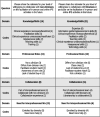Non-clinician involvement in interprofessional health sciences education: educator experiences and attitudes
- PMID: 40342308
- PMCID: PMC12058338
- DOI: 10.5195/jmla.2025.1763
Non-clinician involvement in interprofessional health sciences education: educator experiences and attitudes
Abstract
Objective: The objective of this study was to assess educator views on the knowledge, skills, and abilities needed by IPE facilitators and to explore their attitudes toward and experiences with non-clinician facilitators of IPE activities, particularly health sciences librarians.
Methods: This qualitative study utilized a novel questionnaire that included both multiple-choice and free-text questions. The latter were grounded in critical incident technique (CIT), a methodology that uses direct observations of human behavior to solve practical problems. The questionnaire was distributed electronically to the study's population of health sciences administrators, faculty, and staff in Texas who were involved with IPE. Multiple-choice data were analyzed via descriptive statistics, while free-text data were coded and analyzed via inductive thematic analysis principles.
Results: There were 48 responses out of 131 individuals contacted directly for a response rate of 36.64%. Educators recognized a wide range of characteristics needed by IPE facilitators but viewed interpersonal skills as most important. While many reported experience with non-clinician facilitators of IPE activities, fewer had experience working with health sciences librarians in these roles. Educator attitudes toward non-clinician facilitators of IPE, including librarians, were largely positive.
Conclusions: The findings of this study indicated that educators view interpersonal skills and the ability to elicit engagement as more important skills for IPE facilitators than a relevant clinical background. With proper facilitator training, non-clinicians could build upon their existing skillsets and increase their involvement with IPE, creating a larger pool of potential facilitators. A greater availability of skilled facilitators could increase the incidence of IPE, potentially resulting in more collaborative care and improved patient outcomes.
Keywords: Interprofessional education; collaborative practice; critical incident technique; facilitation; inductive thematic analysis; qualitative research.
Copyright © 2025 Rachel R. Helbing, Robert C. Hausmann.
Figures






Similar articles
-
Exploring interprofessional collaboration and attitudes of health sciences librarians.J Med Libr Assoc. 2020 Jul 1;108(3):440-451. doi: 10.5195/jmla.2020.804. J Med Libr Assoc. 2020. PMID: 32843875 Free PMC article.
-
Unpacking the perceptions and experiences of student facilitators in interprofessional education: a qualitative study.Med Educ Online. 2024 Dec 31;29(1):2330257. doi: 10.1080/10872981.2024.2330257. Epub 2024 Mar 17. Med Educ Online. 2024. PMID: 38493489 Free PMC article.
-
Sustainable interprofessional education programmes: What influences teachers to stay involved?J Interprof Care. 2023 Jul-Aug;37(4):637-646. doi: 10.1080/13561820.2022.2115470. Epub 2022 Oct 20. J Interprof Care. 2023. PMID: 36264071
-
Can We Realize Our Collaborative Potential? A Critical Review of Faculty Roles and Experiences in Interprofessional Education.Acad Med. 2022 Nov 1;97(11S):S87-S95. doi: 10.1097/ACM.0000000000004909. Epub 2022 Aug 9. Acad Med. 2022. PMID: 35947466 Review.
-
Attitudes towards Interprofessional education in the medical curriculum: a systematic review of the literature.BMC Med Educ. 2020 Aug 6;20(1):254. doi: 10.1186/s12909-020-02176-4. BMC Med Educ. 2020. PMID: 32762740 Free PMC article.
References
-
- World Health Organization. Framework for action on interprofessional education and collaborative practice [Internet]. Geneva: World Health Organization. 2010. [cited 10 Apr 2023]. https://iris.who.int/handle/10665/70185.
-
- Islam MA, Talukder RM, Taheri R, Dutta A. Pharmacy relative to other health professions in interprofessional education: a bibliometric study. J Natl Black Nurses Assoc. 2019. Dec;30(2):38–43. - PubMed
-
- Bradley DR, Rana GK, Lypson ML, Hamstra SJ. A centralized practice-based learning and improvement curriculum for residents and fellows: a collaboration of health sciences librarians and graduate medical education administration. J Med Libr Assoc. 2010. Apr;98(2):175–8. DOI: 10.3163/1536-5050.98.2.013. - DOI - PMC - PubMed
MeSH terms
LinkOut - more resources
Full Text Sources
